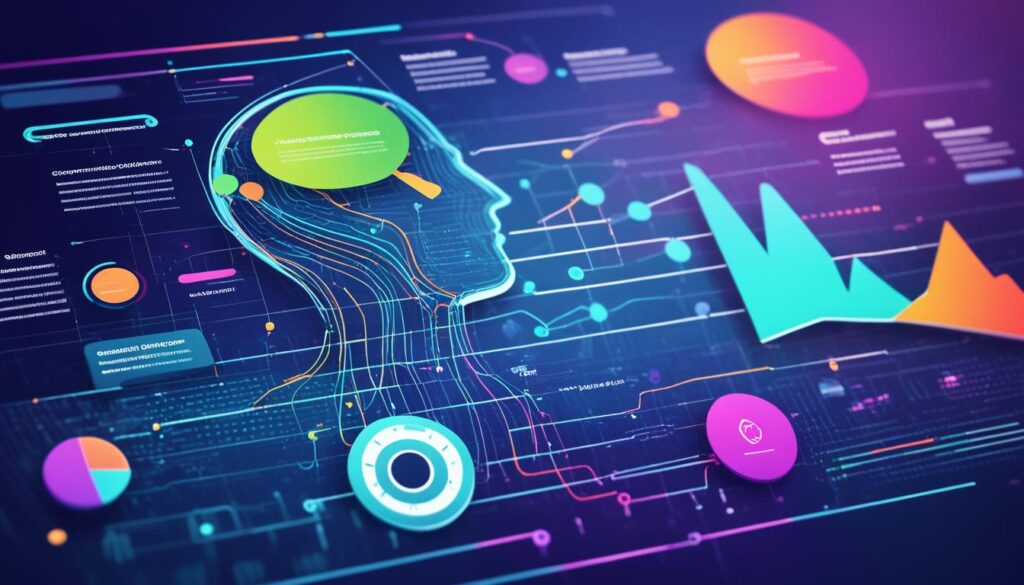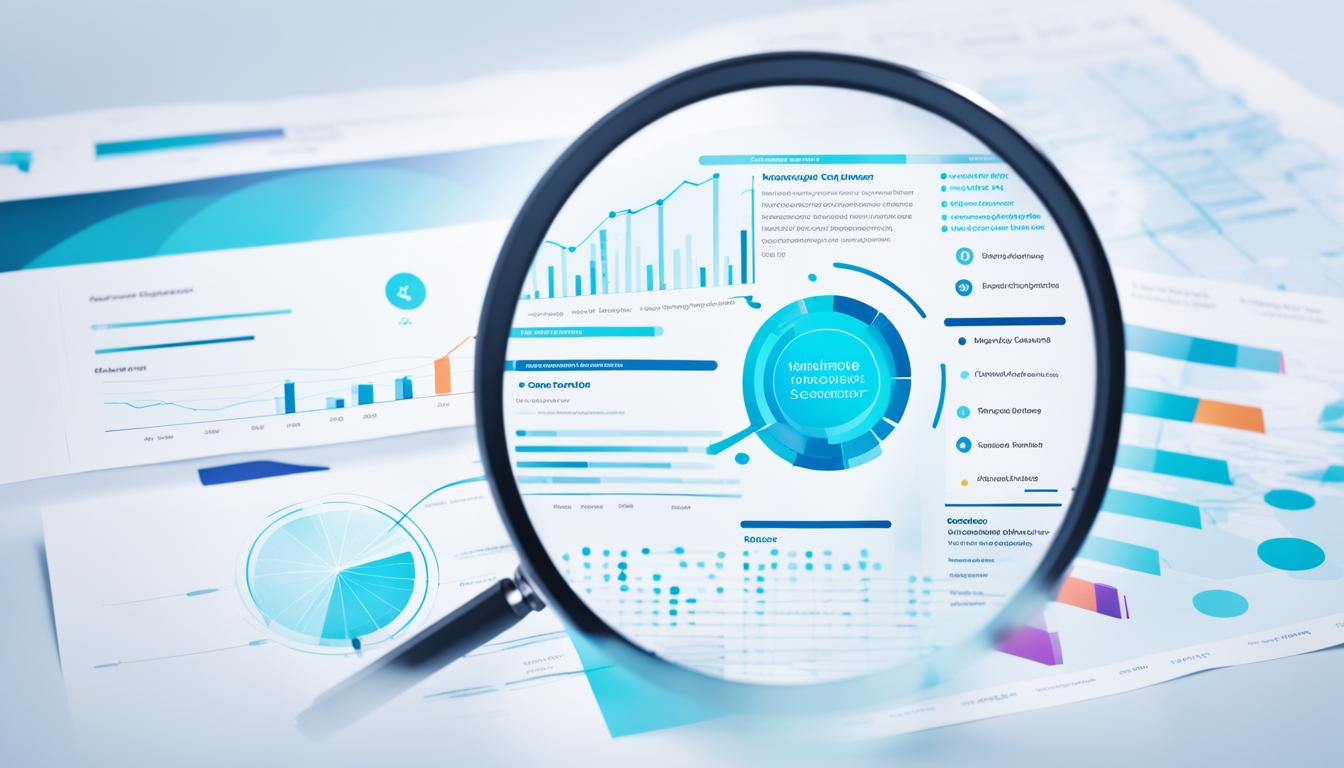Are you looking to gain a deeper understanding of your customers? Do you want to improve your market research methods to make more informed business decisions? Artificial Intelligence (AI) can be a game-changer when it comes to augmenting market research and extracting valuable customer insights.
Traditional methods of gathering customer insights, such as surveys and focus groups, have their limitations. They can be biased, costly, and time-consuming. Fortunately, AI-powered tools like data mining and sentiment analysis offer a more efficient and effective way to gather insights. By tapping into customer data and feedback, AI provides deeper, more accurate insights with less bias and better predictive capabilities.
In this article, we will explore how AI can enhance customer understanding and improve market research methods. We will discuss the limitations of surveys in market research and how AI can overcome these limitations. We will also delve into leveraging AI for customer behavior analysis and reducing bias in market research. Additionally, we will highlight real-world use cases of AI in market research and its role in product innovation. Finally, we will address the important aspect of balancing AI automation with human expertise in market research.
Stay tuned to discover how AI can revolutionize your market research, unlock valuable customer insights, and drive the success of your business.
Key Takeaways:
- AI has the potential to augment market research and provide valuable customer insights.
- Surveys and focus groups have limitations such as biases, high costs, and responder fatigue.
- AI-powered tools like data mining and sentiment analysis offer a more efficient and effective way to gather customer insights.
- AI can analyze behavioral patterns and build predictive models for better understanding customer behavior.
- Using AI in market research can help reduce biases and improve the quality and accuracy of insights.
The Limitations of Surveys in Market Research
Surveys are a common method used in market research to gather insights from customers. However, they have inherent limitations that can affect the quality and accuracy of the findings.
One major flaw of surveys is their limited predictive value. Surveys often present responders with choices, limiting their ability to express their true preferences or behaviors accurately. This can lead to findings that don’t align with the actual actions and decisions customers make in real-life situations.
Responder fatigue is another challenge in surveys. As the number of questions increases, respondents may become fatigued or lose interest, leading to less reliable or incomplete responses. This can affect the credibility of the data collected and the insights derived from it.
Moreover, surveys are susceptible to biases. The study design and the wording of survey questions can unintentionally reflect the company’s agenda or influence respondents’ answers, leading to biased results. Biases can skew the findings and provide inaccurate insights into customer preferences or behaviors.
“Surveys often present responders with choices, limiting their ability to express their true preferences or behaviors accurately.”
To overcome these limitations, market researchers can leverage AI-powered tools. AI can mine customer data to understand actual behaviors and preferences, providing deeper insights beyond the limitations of surveys. By analyzing larger datasets, AI reduces the potential for bias and provides a more comprehensive understanding of customer behavior.
In addition, AI can improve the speed and accuracy of insights by automating data analysis and interpretation. By eliminating manual analysis processes, AI enables researchers to derive insights quickly and efficiently, enhancing the overall market research process.
“AI can mine customer data to understand actual behaviors and preferences, providing deeper insights beyond the limitations of surveys.”
To visually illustrate the limitations of surveys in market research, the following table provides a comparison between surveys and AI-powered methods:
| Surveys | AI-powered Methods | |
|---|---|---|
| Predictive Value | Limited | Enhanced |
| Responder Fatigue | Potential | Reduced |
| Bias | Possible | Minimized |
| Speed and Accuracy | Variable | Improved |
By recognizing the limitations of surveys and embracing AI-powered methods, market researchers can overcome these challenges and gain deeper, more accurate insights into customer behaviors and preferences.
Leveraging AI for Customer Behavior Analysis
AI has revolutionized the field of market research by enabling businesses to analyze customer behavior with greater accuracy and efficiency. Through the use of AI-driven insights and data mining techniques, businesses can extract valuable information from vast amounts of customer data, allowing for a more comprehensive understanding of their target audience.
Identifying Behavioral Patterns and Predicting Customer Behavior
By leveraging AI technology, businesses can analyze customer interaction histories and detect recurring patterns of behavior. This data mining process uncovers valuable insights into customer preferences, allowing businesses to predict future behavior and tailor their marketing strategies accordingly.
AI lowers the requirement for structuring customer data, making it easier and faster to derive insights. The speed at which AI can analyze vast amounts of data enables businesses to make informed decisions and adapt their strategies in real-time.
Furthermore, AI can evaluate a broad range of behaviors and scenarios, providing insights with both predictive and explanatory powers. This allows businesses to gain a deeper understanding of customer motivations and preferences, enabling them to create targeted marketing campaigns and personalized experiences.
Customer Data-Driven Segmentation and Survey Questions
Customer data-driven segmentation is enhanced through AI technology. By analyzing customer data, businesses can identify distinct customer segments based on behavior, demographics, and other relevant factors. These segments can then inform the design of survey questions, facilitating more targeted research and uncovering specific problems or opportunities.
During the customer data mining stage, businesses can uncover valuable insights that guide further research. This approach ensures that survey questions address key areas of interest, leading to more accurate and actionable findings.
Enhancing Market Research with AI-Driven Insights
AI-driven insights play a crucial role in enhancing market research efforts. By leveraging AI technology, businesses can gain a comprehensive understanding of customer behavior and preferences, allowing for more accurate predictions and informed decision-making.
With AI’s ability to analyze large volumes of data and identify behavioral patterns, businesses can uncover hidden trends and gain a competitive advantage. AI-driven insights enable businesses to stay ahead of customer demands, tailor their products and services, and optimize their marketing strategies.
To illustrate the power of AI-driven insights in market research, consider the following example:
Using AI technology, a retail company analyzed customer shopping patterns and identified that a significant portion of their customers made repeat purchases during specific seasons. By leveraging this insight, the company was able to develop targeted promotions and personalized recommendations, resulting in increased customer loyalty and higher sales.
AI-driven insights provide businesses with valuable information that can support robust strategies, drive innovation, and exceed customer expectations.

In Summary
By leveraging AI for customer behavior analysis, businesses can gain a deeper understanding of their target audience and predict future behavior. AI-driven insights enable businesses to segment their customers, inform survey questions, and address specific problems or opportunities. These insights empower businesses to enhance market research efforts, drive personalized marketing campaigns, and make data-driven decisions that lead to long-term success.
Reducing Bias in Market Research with AI
Surveys are significantly susceptible to biases, as the study design and questions often reflect the company’s agenda rather than the essential needs of customers. However, AI can be leveraged to minimize bias and improve the quality of market research insights.
To reduce bias, AI can evaluate minimally prompted feedback from various sources like social media, chat logs, and open-ended questions. By analyzing large volumes of open-ended responses, AI-powered text mining and sentiment analysis capabilities can identify critical perceptions, attitudes, and needs.
This approach allows market researchers to gain a deeper understanding of customer sentiments and uncover hidden insights that might be missed with traditional survey methods. By revealing AI-driven needs, market research projects can be designed to yield more comprehensive insights that better support market strategies with reduced bias.
The Role of Text Mining and Sentiment Analysis with AI
Text mining and sentiment analysis with AI are powerful tools in reducing bias within market research. They enable the evaluation of large amounts of unstructured data and help identify key themes, sentiments, and patterns that are crucial for extracting meaningful insights.
Text mining algorithms can analyze vast amounts of open-ended responses and extract essential information, such as customer preferences, pain points, and expectations. This allows researchers to gain a more accurate understanding of customer needs, without the limitations posed by fixed-choice survey questions.
Sentiment analysis, on the other hand, helps detect and classify the sentiment expressed in text data, such as positive, negative, or neutral. By analyzing sentiment, market researchers can identify potential biases within the collected feedback and adjust their research methods accordingly.
“Text mining and sentiment analysis capabilities powered by AI enable the evaluation of large volumes of open-ended responses to identify critical perceptions, attitudes, and needs.”
Benefits of Minimizing Biases with AI
Minimizing biases in market research through AI-powered techniques has several benefits for businesses aiming for accurate and reliable insights. These benefits include:
- Increased objectivity: AI eliminates human biases and preconceptions, providing a more objective analysis of customer feedback.
- Deeper insights: By uncovering hidden insights and identifying critical perceptions and attitudes, AI can yield a more comprehensive understanding of customer needs.
- Better decision-making: Reduced bias allows businesses to make data-driven decisions based on accurate insights, leading to more effective strategies and improved customer satisfaction.
- Enhanced research design: AI-driven insights help shape market research projects, allowing for more targeted surveys and research methodologies.
By leveraging AI to minimize biases in market research, businesses can acquire a more accurate understanding of their target audience, improve customer experiences, and gain a competitive edge in the market.
Now let’s explore some real-life use cases of how AI can enhance market research and provide deeper insights into customer behavior.

img {
display: block;
margin-left: auto;
margin-right: auto;
max-width: 100%;
height: auto;
}
AI-Enhanced Market Research Use Cases
AI offers numerous use cases in the field of market research, providing businesses with valuable insights and a deeper understanding of their customers. By leveraging AI technology, organizations can unlock the potential for improved customer understanding, deeper insights, and better predictive capabilities. Let’s explore two key examples where AI can significantly enhance market research.
Leveraging AI for Customer Behavior Analysis
One of the primary ways AI enhances market research is by analyzing customer behavior and preferences. Through advanced data mining techniques, AI can identify patterns and trends that may be overlooked by traditional research methods. By understanding customer behaviors, AI enables businesses to make informed decisions and optimize marketing strategies. With AI-driven insights, organizations can segment their customers more effectively and gain a comprehensive understanding of their behaviors and needs.
Evaluating Consumer Feedback for Deeper Insights
AI also plays a crucial role in evaluating consumer feedback, providing businesses with valuable insights into their products and services. By leveraging AI-powered sentiment analysis, organizations can gather and analyze vast amounts of data from sources such as surveys, social media, and customer reviews. AI can uncover valuable insights, identify emerging trends, and help companies better understand their customers’ preferences. With AI technology, businesses can proactively anticipate market trends, personalize product experiences, optimize features, and improve efficiency in design processes.

AI-powered market research offers numerous benefits, including deeper insights at lower costs, reduced bias, and better predictive capabilities. Through the analysis of customer behavior and preferences, as well as the evaluation of consumer feedback, AI enables businesses to stay ahead of the competition and make data-driven decisions that drive success.
The Role of AI in Product Innovation
AI plays a significant role in driving product innovation and revolutionizing the way businesses operate. By harnessing the power of artificial intelligence, companies can unlock new opportunities, enhance customer experiences, and streamline their processes for greater efficiency and effectiveness. In this section, we will explore how AI enables product innovation through various key aspects.
Using AI for Consumer Insights
One of the crucial ways AI drives product innovation is by providing valuable consumer insights. With AI-powered analytics, businesses can collect, analyze, and interpret vast amounts of consumer data from sources like surveys, social media, and customer reviews. This enables companies to gain a comprehensive understanding of their target audience’s preferences, behaviors, and demands. By leveraging these insights, businesses can identify emerging trends, anticipate market needs, and develop innovative solutions that resonate with their customers.
Predictive Analytics in Product Innovation
Predictive analytics is another vital component of AI-driven product innovation. By utilizing machine learning algorithms and statistical models, businesses can predict future behaviors and trends. Through predictive analytics, companies can forecast product demand, identify potential risks and opportunities, and make data-backed decisions. This empowers businesses to optimize their product offerings, allocate resources effectively, and stay ahead in the competitive market.
Personalization with AI
Personalization is a key factor that customers seek in their product experiences. AI enables businesses to create personalized experiences by leveraging consumer data and preferences. By analyzing customer insights, AI algorithms can tailor recommendations, offers, and interactions to individual preferences, resulting in more personalized and engaging experiences for customers. By incorporating personalization into their products, businesses can enhance customer satisfaction, foster loyalty, and drive repeat sales.
Quality Assurance with AI
Ensuring product quality is essential for businesses to maintain customer satisfaction and brand reputation. AI plays a crucial role in quality assurance by automating and optimizing the testing process. With AI-powered testing tools, businesses can detect bugs and defects more efficiently, perform comprehensive quality checks, and improve overall product reliability. This allows businesses to deliver high-quality products to the market faster and more consistently.
AI for Speed and Efficiency in Product Innovation
Time-to-market is a critical factor in today’s fast-paced business environment. AI can expedite the product innovation process by automating repetitive tasks, analyzing data at scale, and generating actionable insights in real-time. This accelerates the development, testing, and optimization of products, enabling businesses to bring innovative solutions to market faster and gain a competitive edge.

In conclusion, AI plays a transformative role in product innovation by enabling businesses to gather and analyze consumer data, predict trends, personalize experiences, ensure quality, and enhance speed and efficiency. By harnessing the power of AI, companies can unleash their creative potential, deliver customer-centric products, and drive success in today’s dynamic market.
Balancing AI Automation and Human Expertise in Market Research
Market researchers are embracing the power of AI automation in market research to streamline their work processes and uncover deeper insights. AI-powered tools have proven invaluable in automating tasks such as data collection, processing, sentiment analysis, and survey design. This automation not only saves time but also enhances efficiency, allowing researchers to focus on more strategic aspects of their work.
However, it is important to strike a balance between AI automation and human expertise to ensure the best outcomes. While AI excels at handling large quantities of data and generating insights, there are certain tasks that human researchers are better equipped to handle. These include research design, interpretation of findings, critical thinking, and ethical considerations.
By combining AI automation with human expertise, market researchers can leverage the strengths of both to enhance the quality of their work. AI can handle repetitive and data-intensive tasks, freeing up researchers’ time for more complex analysis and strategic decision-making. On the other hand, human researchers bring their domain knowledge, contextual understanding, and critical thinking skills to the table, which is essential for research design and the interpretation of nuanced insights.
Ultimately, the ideal approach is to create a collaborative environment where AI and human researchers work together seamlessly. This means utilizing AI automation for tasks that can be reliably and accurately performed by machines, while allowing human researchers to focus on tasks that require human judgment, creativity, and empathy.
“AI and human expertise can complement each other in market research, creating a synergy that results in better insights and more informed decision-making.”
For example, AI automation can significantly speed up the data collection and analysis process, allowing researchers to gather insights from large datasets in a fraction of the time. AI can also help identify patterns and trends that human researchers may overlook, leading to more comprehensive and accurate findings.
However, human researchers play a crucial role in refining research questions, selecting appropriate methodologies, and ensuring that ethical considerations are taken into account. They bring a level of understanding and context that AI algorithms alone cannot achieve. Human researchers also possess the ability to think critically and apply their expertise to interpret complex insights in a meaningful way.
In summary, AI automation in market research offers an array of benefits, but it is important to strike a balance between AI and human expertise. By combining the power of AI automation with the unique skills of human researchers, market research can be enhanced to reveal deeper insights, drive innovation, and inform strategic decision-making.
| Tasks for AI in Market Research | Tasks for Human Researchers |
|---|---|
| Data collection and processing | Research design |
| Sentiment analysis | Interpretation of findings |
| Survey design | Critical thinking |
| Data mining | Ethical considerations |
Conclusion
AI has revolutionized market research, offering numerous benefits for businesses seeking to uncover valuable customer insights. By leveraging AI technologies, such as data mining and sentiment analysis, companies can enhance the efficiency and effectiveness of their research process.
One of the key advantages of AI in market research is its ability to provide deeper insights with reduced bias. By tapping into vast amounts of customer data, AI-powered tools can uncover behavioral patterns, predict future trends, and inform decision-making processes. This level of accuracy and predictive capability surpasses the limitations of traditional methods like surveys, which often suffer from responder fatigue and biases.
The future prospects of AI in market research are promising. As technology continues to advance, we can expect more sophisticated AI applications tailored to meet the specific needs of businesses. AI holds enormous potential for transforming market research, empowering companies to stay ahead of the competition and make data-driven decisions that drive success.
FAQ
How can AI enhance market research and glean customer insights?
AI can augment market research and glean customer insights by leveraging data mining and sentiment analysis tools to provide deeper, more accurate insights with less bias and better predictive capabilities.
What are the limitations of surveys in market research?
Surveys often present responders with choices or isolate pain points from the larger context of their lives, resulting in findings that don’t align with actual customer behavior. Surveys also have limitations such as biases, poor predictive power, high costs, and responder fatigue.
How can AI be utilized for customer behavior analysis?
AI can be used for customer behavior analysis by leveraging customer interaction histories and data mining techniques to identify behavioral patterns and build predictive models. This enables businesses to understand customer preferences and behaviors more accurately.
How can AI help reduce bias in market research?
AI can help reduce bias in market research by evaluating minimally prompted feedback from sources like social media, chats, and open-ended questions. Text mining and sentiment analysis powered by AI can evaluate large volumes of responses to identify critical perceptions, attitudes, and needs with reduced bias.
What are some use cases of AI in market research?
AI can be used in market research to better understand customer behavior and preferences, as well as evaluating consumer feedback to uncover valuable insights. AI provides deeper insights at lower costs, with less bias and better predictive capabilities.
How does AI play a role in product innovation?
AI enables businesses to gather and analyze consumer data, predict future behaviors and trends, identify desirable features, personalize product experiences, streamline quality assurance processes, and accelerate the product innovation process.
How can AI automation and human expertise be balanced in market research?
AI automation can be used to save time and improve efficiency in market research, but tasks such as research design, interpretation, critical thinking, and ethics are better suited for human expertise. Balancing both AI automation and human expertise ensures the benefits of both are leveraged effectively.
What are the benefits of AI in market research?
AI offers benefits such as improved efficiency, reduced bias, better predictive capabilities, and deeper insights. By leveraging AI, businesses can stay ahead of the competition and make data-driven decisions that drive success.








